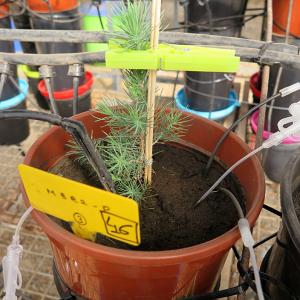
MInisterio de Economía y Competitividad: 83.490 €
From January 1st, 2014 to December 31st, 2017
Universidad Politécnica de Cartagena
Vrije University Amsterdam (Netherlands)
The main goal of the project is to study the effect of biochar (produced from agricultural/urban wastes) in the biogeochemistry and toxicity of mining wastes.
This proposal will focus on proposing suitable scientific and technical alternatives for the revegetation of mine tailings in the Sierra of Cartagena La Unión (SE Spain), an arid area, which is specially vulnerable to the consequences of global climate change. A strategy for the environmental restoration at middle-long term will be implemented, including the assessment of the toxicity risks associated to the high metal(loid) concentrations. Therefore, the main goal of the project is to study the effect of biochar (produced from agricultural/urban wastes) in the biogeochemistry and toxicity of mining wastes. Moreover, the influence of these effects in the growth performance of two tree native species, Pinus halepensis and Tetraclinis articulata, will be evaluated. These two species are considered as key species to effect the long term phytomanagement of mine tailings in semiarid areas. The resulting conclusions derived from the project will help in the improvement of the revegetation of semiarid polluted sites.
The proposal includes field and experimental phases. The latter will be performed in mesocosms. The field part has as a main goal the in situ evaluation of the soil improvement by P.halepensis and T.articulata at mine tailings. The potential facilitation effect of these trees species for the long-term restoration of the ecosystem will be discussed. In the experimental part, the suitability of the biochar for the improvement of edaphic properties at mine tailings will be evaluated, including the effect in metal(oid) mobility (soil water/soil drainage). In addition, the resulting effects on ecotoxicology will be evaluated employing seeds, seedlings and edaphic fauna as bioindicators. Finally, the interaction effects between biochar and trees will be discussed in order to evaluate the role of the latter in altering/favouring soil long term stabilisation.
PAPERS JCR
- Martínez-Oró D, Párraga-Aguado I, Querejeta JI, Álvarez-Rogel J, Conesa HM. (2018). Nutrient limitation determines the suitability of a municipal organic waste for phytomanaging metal(loid) enriched mine tailings with a pine-grass co-culture. Chemosphere. 25; 214:436-444. ISSN: 0045-6535. doi: 10.1016/j.chemosphere.2018.09.147.
- Martínez-Oró, D., Párraga-Aguado, I., Querejeta, J.I., Conesa, H.M. 2017. Importance of intra- and interspecific plant interactions for the phytomanagement of semiarid mine tailings using the tree species Pinus halepensis. Chemosphere. 186:405-413
OTHER PUBLICATIONS
- Párraga-Aguado, I., González-Alcaraz, M.N., Álvarez-Rogel, J., Jiménez-Cárceles, F.J., Conesa H.M. 2016. Gradientes edáficos y microbiológicos en balsas mineras de la Sierra de Cartagena‐La Unión Actas del III Workshop en Investigación Agroalimentaria. Editores: F. Artés-Hernández , M. Egea-Cortines, A. Palop-Gómez, S. Bañón-Arias, P. Bielza. Editorial: Universidad Politécnica de Cartagena. pp. 179-182. ISBN: 978-84-697-1358-7
CONGRESSES
- Conesa, H.M. 2016. La importancia de los nichos edáficos y los aspectos ecofisiológicos para la sostenibilidad en el fitomanejo de residuos mineros. Nuevas perspectivas para la restauración ecológica de balsas mineras en ambientes semiáridos Cartagena, España, 17 de noviembre de 2016
- Conesa, H.M. 2016. La importancia de los nichos edáficos y los aspectos ecofisiológicos para la sostenibilidad en el fitomanejo de residuos mineros. SIMPOSIO LIFE 2016. Madrid, España. 15 al 16 de junio de 2016
